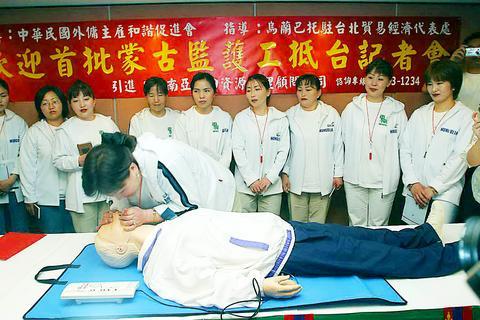The first group of caregivers hired from Mongolia are all well-educated, including experienced nurses and several high school teachers, a local manpower agent said yesterday.
The first group of 11 Mongolian caregivers arrived last week and 10 of them have university degrees, the manpower agent said.
The Council of Labor Affairs formally opened the job market to Mongolians on Jan. 19.

PHOTO: ROC FOREIGN LABOR AND EMPLOYER HARMONY PROMOTION COMMITTE
All of the 11 Mongolian workers met the media at a news conference yesterday. All of them are women, with an average age of 30.
Dagba Batmunkh, director of the Ulaanbaatar Trade and Economic Representative Office in Taipei and Dolgoryn Sukhbaatar, a department chief at Mongolia's Social Welfare and Labor Affairs Ministry, were also present at the news conference.
Sukhbaatar said more than 7,000 Mongolians have filed applications to work in Taiwan and about 1,000 of them have received Chinese language training.
The second batch of Mongolian workers are scheduled to arrive in Taiwan on June 1, Sukhbaatar said, adding that he hoped the number of Mongolians working in Taiwan can reach 10,000 by next May.
Batmunkh said Mongolia's per capita national income is only about US$450. To the best of his understanding, Batmunkh said, many of his compatriots look forward to working in Taiwan.
"Most Mongolian people are competent and I'm hopeful that labor affairs cooperation between our two countries will proceed smoothly and satisfactorily," Batmunkh said.
Chou Shao-chuan (
"The Mongolian government is more willing to help verify the personal backgrounds of Mongolian applicants," Chou said, adding that it usually takes three to four months for local employers to complete formalities for importing Vietnamese and Indonesian workers.
The first group of Mongolian caregivers include a nurse with 11 years experience at a Mongolian hospital and even several high-school teachers.
A 30-year-old former high school teacher, known as Sulun, said her monthly salary in Mongolia is slightly more than US$70 or around NT$2,400.
"I hope to earn more money during my three years of work in Taiwan. I want to save money so that I can buy a house when I return home," Sulun said, adding that she also hopes to improve her Chinese proficiency during her stay in Taiwan.
Sulun has studied Chinese for three years.
Sulun's husband is a physical education teacher.
"If my work in Taiwan goes well, my husband may also apply to work here," she added.

A preclearance service to facilitate entry for people traveling to select airports in Japan would be available from Thursday next week to Feb. 25 at Taiwan Taoyuan International Airport, Taoyuan International Airport Corp (TIAC) said on Tuesday. The service was first made available to Taiwanese travelers throughout the winter vacation of 2024 and during the Lunar New Year holiday. In addition to flights to the Japanese cities of Hakodate, Asahikawa, Akita, Sendai, Niigata, Okayama, Takamatsu, Kumamoto and Kagoshima, the service would be available to travelers to Kobe and Oita. The service can be accessed by passengers of 15 flight routes operated by

GIVE AND TAKE: Blood demand continues to rise each year, while fewer young donors are available due to the nation’s falling birthrate, a doctor said Blood donors can redeem points earned from donations to obtain limited edition Formosan black bear travel mugs, the Kaohsiung Blood Center said yesterday, as it announced a goal of stocking 20,000 units of blood prior to the Lunar New Year. The last month of the lunar year is National Blood Donation Month, when local centers seek to stockpile blood for use during the Lunar New Year holiday. The blood demand in southern Taiwan — including Tainan and Kaohsiung, as well as Chiayi, Pingtung, Penghu and Taitung counties — is about 2,000 units per day, the center said. The donation campaign aims to boost

MORE FALL: An investigation into one of Xi’s key cronies, part of a broader ‘anti-corruption’ drive, indicates that he might have a deep distrust in the military, an expert said China’s latest military purge underscores systemic risks in its shift from collective leadership to sole rule under Chinese President Xi Jinping (習近平), and could disrupt its chain of command and military capabilities, a national security official said yesterday. If decisionmaking within the Chinese Communist Party has become “irrational” under one-man rule, the Taiwan Strait and the regional situation must be approached with extreme caution, given unforeseen risks, they added. The anonymous official made the remarks as China’s Central Military Commission Vice Chairman Zhang Youxia (張又俠) and Joint Staff Department Chief of Staff Liu Zhenli (劉振立) were reportedly being investigated for suspected “serious

ENHANCING EFFICIENCY: The apron can accommodate 16 airplanes overnight at Taoyuan airport while work on the third runway continues, the transport minister said A new temporary overnight parking apron at Taiwan Taoyuan International Airport is to start operating on Friday next week to boost operational efficiency while the third runway is being constructed, the Ministry of Transportation and Communications said yesterday. The apron — one of the crucial projects in the construction of the third runway — can accommodate 16 aircraft overnight at the nation’s largest international airport, Minister of Transportation and Communications Chen Shih-kai (陳世凱) told reporters while inspecting the new facility yesterday morning. Aside from providing the airport operator with greater flexibility in aircraft parking during the third runway construction,